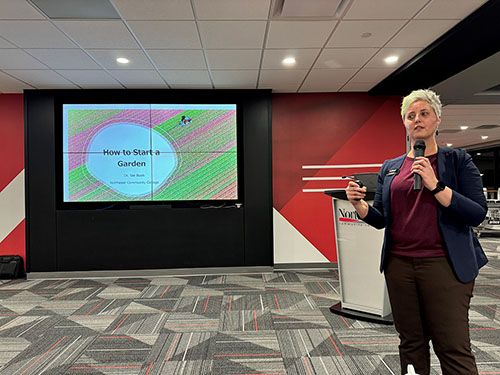NORFOLK, Neb. – From mulching to mold, Tee Bush knows a thing or two about gardening.
Bush is in her fifth year teaching at Northeast Community College as an agriculture instructor. She holds bachelor’s and master’s degrees in horticulture from the University of Nebraska-Lincoln. While she also has a doctorate of philosophy from UNL, her experience growing plants and gardening goes back even further.
Bush grew up on a ranch in Nebraska and knows the earthy smell that comes after a rain. That’s a healthy smell, especially when composting.
“That comes from the bacteria and the fungus being awakened and doing their job,” Bush said. “We want that earthy smell in our compost. It should be very natural to composting.”
Bush, who was the most recent speaker at the college’s Hawk Talks, at times resembled a panelist on “Backyard Farmer,” the long-running program that airs on Nebraska Public Media. Not only was she knowledgeable, but she answered questions from the audience based on science and experience.
“If you want to know anything about horticulture in this part of Nebraska, Dr. Tee Bush is the person you want to know,” said Paul Muncy, who coordinates Hawk Talks as a way for students, staff and the public to gain firsthand knowledge on a range of topics.
Bush, who previously taught at Nebraska College of Technical Agriculture in Curtis, was asked a lot about soil, composting, cold- and warm-weather vegetables, commercial growing and food safety.
Keep in mind, she said, thin-skinned fruits and vegetables, such as tomatoes and cucumbers, are considered contaminated any time they touch the ground.
“You wouldn’t want to eat that product. They can’t be sold commercially if they have touched the soil. That’s why you see a lot of plastic used in commercial farming.”
Gardens come in all sizes. They include on the ground, raised beds, containers and indoor gardens. When it comes to mulching, Bush advises against using plastic or anything that could end up in the landfill.
Newspapers that are overlapped and covered with grass or wood chips are effective and cheap.
“Newspaper is probably the most effective weed barrier overall that is natural,” she said. “Newspapers do need to have something on them, however, or they will blow away.”
Other tips presented during her talk:
• Don’t water tomatoes overhead, like many other plants in the garden. Fungal spores will develop and splash to other areas. Water tomatoes on the ground. Also with tomatoes, consistent watering is important to keep the fruit from splitting, which sometimes happens with drought followed by heavy watering.
• While seed catalogues are out now and can create excitement, only purchase seeds from reputable companies. Otherwise, it is possible that the gardener might get everything from a different variety of the plant to a different plant entirely.
• Heirloom seeds are saved through selection and typical lineages are from at least 1951. Heirloom produce often have colorful or distinctly favored fruits and vegetables and are open-pollinated. Hybrids, which also are popular, are typically stronger, more vigorous and have more disease and insect resistance.
• Most gardeners get excited for planting and sometimes start too early indoors and transplant too soon into the outdoor soil. Based on 30 years of data, the northeast Nebraska frost threats vary, but low risk of frost usually isn’t until about April 29-May 12 for northeast Nebraska east of Norfolk, and May 13-19 for much of Madison County and areas farther west in this region. Farther west in the Sandhills, a more significant risk of frost remains until May 20. In the Sandhills, it can be after June 1 and later in the month.
• With minor fungal issues in the garden, it is OK to cut or tear off the leaves or foliage. In fact, that will help to promote more air flow and reduce fungal pressure. If there is extreme fungus or a viral infection, don’t add the plant to the compost pile. Viruses can live through extreme conditions.
• Be mindful and respectful of other gardeners and pollinators, especially with use of chemicals. UNL offers a Bee Check Map that beekeepers use to register their beehives online. Bees are a protected resource now.
• Soil is the biggest factor to the “where” of planting a garden. The space will determine what can be planted. If there is only a container of soil, for example, maybe only peppers can be grown. Potatoes and carrots are relatively easy. Anything that is of a vine nature will require a lot of space.
• Trial and error are the best friends of a gardener. Lots of free information is available online, including from the University of Nebraska Extension, but there is no substitute for learning by doing.
How to Start a Garden, Bush
Tee Bush, a Northeast Community College ag instructor, provides information about gardening that would be beneficial to everyone from beginners to experienced green thumbs during a recent Hawk Talk. (Northeast Community College)
###

